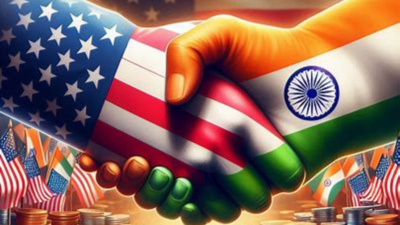India to seek relaxed export controls and tech access in bilateral trade deal with US: Report

India is preparing to formally request the United States for relaxed export controls and enhanced access to advanced technologies under the proposed bilateral trade agreement (BTA), according to sources quoted by news agency PTI.
The concessions India seeks are similar to those granted by the US to close allies like Australia, the United Kingdom, and Japan.
New Delhi reportedly aims to secure greater access in sectors such as telecommunications equipment, biotechnology, artificial intelligence (AI), pharmaceuticals, quantum computing, and semiconductors. In parallel, India is pushing for tariff reductions on labour-intensive exports including textiles, gems and jewellery, leather goods, garments, plastics, chemicals, shrimp, oil seeds, grapes, and bananas.
Conversely, the US is seeking duty concessions for industrial goods, automobiles (particularly electric vehicles), wines, petrochemical products, dairy, and agricultural products such as apples and tree nuts.
India’s demand for technology access parity with US allies stems from the need to strengthen its innovation ecosystem, technological infrastructure, and broader economic development. However, the Indian commerce ministry, which leads the negotiations, has not commented publicly on the developments.
Reports from the Global Trade Research Initiative (GTRI) note that the US has recently eased export controls to boost technology collaboration with trusted allies under initiatives like the AUKUS security pact. Starting September 1 last year, around 80 per cent of defence-related exports to Australia and the UK no longer require individual licences. Similarly, new US controls introduced last year on quantum computing and semiconductor exports largely exempt G7 partners such as Australia, the UK, and Japan, allowing smoother technology flows.
On India’s request, GTRI founder Ajay Srivastava observed that while Washington is keen to deepen tech ties with India – particularly under the Quad framework – full parity with Australia, the UK, and Japan may not be immediately feasible. “American officials could cite concerns over India’s export control regime, intellectual property protection, cybersecurity standards, and defence relations with Russia.Instead of blanket exemptions, the US may propose trusted partner programmes, project-specific licences, or expanded licensing exceptions for select Indian entities,” Srivastava said.
The BTA’s terms of reference reportedly cover 19 chapters, addressing tariffs, goods, services, rules of origin, non-tariff barriers, and customs facilitation. An Indian delegation recently visited Washington to address outstanding differences before formal negotiations, which are scheduled to start during the ongoing 90-day tariff pause period that began on April 10.
The US remained India’s largest trading partner for the fourth consecutive year in 2024-25, with bilateral trade reaching $131.84 billion. The US accounted for around 18 per cent of India’s total goods exports, 6.22 per cent of imports, and 10.73 per cent of overall merchandise trade. India maintained a goods trade surplus with the US of $41.18 billion in 2024-25, continuing a trend of rising surpluses in recent years- $35.32 billion in 2023-24, $27.7 billion in 2022-23, $32.85 billion in 2021-22, and $22.73 billion in 2020-21.
However, Washington has raised concerns about the widening trade imbalance as part of its broader trade discussions with New Delhi.





